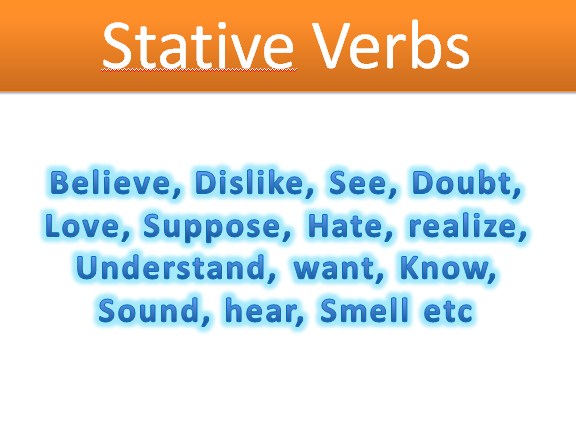Last Updated on October 13, 2019 by Skillslelo
Here is a list of common verbs which are not often used in progressive or continuous forms. They are called state or stative verbs or non progressive verbs.
Mental and emotional stative verbs
Believe| Believe what you wish.They believe you. ( not They are believing you.)
Dislike| He dislikes swimming. (not He is disliking swimming.)
See (= understand)| I see what you mean. ( not I’m seeing what you mean.)
Doubt| Why do you doubt me. ( not Why are you doubting me.)
Love| He loves her. ( not He is loving her.)
Suppose| I suppose he comes there. ( not I’m supposing he comes there.)
Feel (= have an opinion)| I feel we shouldn’t do it. ( not I ’m feeling we shouldn’t do it.)
Think (= have an opinion)| I think he is Indian. ( not I’m thinking he is Indian.)
Hate| He hates me. ( not He is hating me.)
Realize| He realized something was wrong. (not he was realizing something was wrong.)
Understand| I understand you. ( not I’m understanding you.)
Imagine| I imagine you are well. (not I’m imaging you are well.)
Recognize| Nobody recognizes him. (not Nobody is recognizing him.)
Want| I’m hungry. I want something to eat. ( not I’m wanting something to eat.)
Know| Everybody knows him. ( not Everybody is knowing him.)
Remember| I remember his face. (not I’m remembering his face.)
Wish| Believe what you wish. (not Believe what you are wishing.)
Use of the senses stative verbs
Feel| I feel we shouldn’t do it. ( not I’m feeling we shouldn’t do it.)
See| Do you see that man over there? ( not Are you seeing that man over there?)
Sound| It sounds dangerous. (not It is sounding dangerous.)
Hear| I don’t hear anything. (not I’m not hearing anything.)
Smell| Does the meat smell bad? (not Is the meat smelling bad? )
Taste| This soup tastes good. ( not This soup is tasting good.)
Note: Can is often used with see, hear, feel, taste, smell, understand and remember to give a kind of progressive meaning, especially in British English).
- I can see Emma coming down the road.
- Can you smell something burning?
Other Non progressive verbs
Agree| I agree with you. ( not I am agreeing with you.)
Impress| I think he impressed her. (not I think he was impressing her.)
Promise| I promise you. ( not I’m promising you.)
Appear| Adam appears to be nervous. (not Adam is appearing nervous.)
Look (= seem)| She looks like she is rich. ( not She is looking like she is rich.)
Seem| It seemed wrong. (not It was seeming wrong.)
Deny| Tom denies those allegations. (not Tom is denying those allegations.)
Be| You are a teacher. (not You are being a teacher.)
Belong| This car belongs to me. (Not This car is belonging to me.)
Fit|This skirt fits well. ( not This skirt is fitting well.)
Need| I need your help. (not I’m needing your help.)
Owe|
Consist| Our family consists of five members. ( not our family is consisting of five members.)
Own| The farmer owns the land . (not The farmer is owning the land.)
Contain| The box contains old magazines. ( not The box is containing old magazines.)
Possess|They possesses three children. ( not They are possessing three children.)
Some of the above verbs can be used in progressive with a difference in meaning (see below).
1. Feel
When ‘feel‘ means ‘have an opinion‘, we do not use the progressive form.
- I feel we shouldn’t do it.
- I feel sure you’re right.
You can use the progressive form to say how somebody feels now.
- I’m feeling fine.
- How are you feeling now?
2. Think
When ‘think‘ means ‘believe or have an opinion‘, we do not use the progressive form.
- What do you think of Kevin? (Opinion)
- Dan thinks Kate is lying. (Believe)
When ‘think‘ means ‘consider, the progressive is possible.
- I’m thinking about our possible reaction. (Consider)
- Adam is thinking of giving up his job. (Consider)
3. See
You can not use the progressive form when ‘see‘ means ‘understand‘.
- I see what you mean.
- I see how you study.
But when ‘see‘ means ‘ meet‘ you can use the progressive form.
- I’m seeing Adam tomorrow.
- I’m seeing her this evening.
4. Be
We can use ‘be‘ in the progressive form to say how somebody is behaving at the moment.
- You’re being stupid.
- I can’t understand why he is being selfish.
